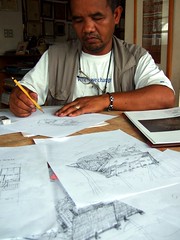 When you are ready to get an architect started on your dream home who should you pick?
When you are ready to get an architect started on your dream home who should you pick? At the top of the list you will need to see examples of an architect's work and find yourself comfortable with their design point of view. In addition to that you'll want to find yourself liking them after an interview. You'll be spend a lot of time and money with them. Work hard to find the right firm. As architecture can be a significant percentage of a home's budget find a firm with consistent experience in residential design. They will be more efficient and responsive.
The more of your own goals that you have been able to flesh out the better you will be able to determine if the architect you are considering shares them.
I have significantly modified a section of the AIA's "You and Your Architect" below in order to focus on residential clients, and I have changed its meaning in places. Click on the link to see the original.
When you are contemplating building your own home, choosing the right architect is vital to a successful project. Some of the many questions about architect selection are addressed below:
Q. At what point in the process of building my dream home should I bring the architect into the picture?
A. As early as possible, however the intent of this website it to reduce the total cost of ownership to clients and I recommend you complete as much leg work as you can prior to engaging an architect. That said, architects can help you define your project in meaningful terms and focus your decision making. They may also do site studies, help secure planning and zoning approvals, help you work out financing, and perform a variety of other predesign services.
Q. How do I find suitable firms to contact?
A. Contact other homeowners who have built their homes with an architect and ask who they interviewed and ultimately selected. Ask who designed a home you admire or that seems especially appropriate. Many local chapters of the American Institute of Architects (AIA Las Vegas) maintain referral lists and are available to assist you in identifying architects who can help you. The AIA maintains the website Architect Finder to help to develop a list.
Q. How many firms should I interview?
A. Consider a brief interview of three to five firms-enough to see the range of possibilities, but not so many that an already tough decision will be further complicated. Narrow it down to two or three immediately and reapproach the ones you feel most confident about.
Interview architecture firms that you feel can do your project because of their expertise, experience and ability to bring a fresh look to your situation. Treat each firm fairly, offering, for example, equal time and equal access to your homesite.
Q. What information should I request from firms?
A. Ask to see projects the firm has designed that are similar in type and size to yours or that have addressed similar issues. Ask them to indicate how they will approach your project and who will be working on it (including consultants). Ask for the names of other owners you may contact. Consider asking for a design budget and a hourly rate sheet to better understand the financial commitment you'll be making. Keep in mind a budget is difficult to provide without detailed information.
Q. Why are formal interviews desirable?
A. An interview addresses one issue that can't be covered in brochures: the chemistry between the owner and the architecture firm. Interviews also allow the owner to learn how each firm plans to approach the project.
Q. What can I realistically expect to learn from an interview?
A. You can learn how the architect's team will approach your project. Ask how the architect will gather information, establish priorities and make decisions. Ask what the architect sees as the important issues for consideration in the project. Evaluate the firm's style, personality, priorities, and approach: are they compatible with yours?
Q. On what should I base my decision?
A. Personal confidence in the architect is paramount. Seek an appropriate balance among design ability, technical competence, professional service and cost. Once you've selected the best firm, enter into detailed negotiations regarding services and compensation. The AIA Contract Documents the industry standard-offer an excellent starting point.
